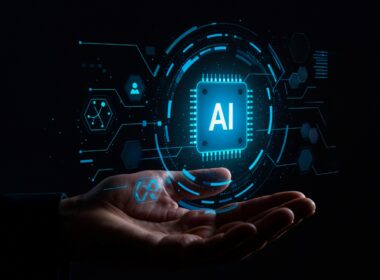30 Different Types of Technology in 2025: Definitions, Examples & Use Cases
Think of a world without technology. No smartphones, no computers, no cars. Hard to picture, right? Technology is so woven into our lives that it shapes how we work, communicate, and interact with everything around us.
From the basic tools our ancestors used to the complex systems powering today’s world, technology has always driven progress. As the saying goes, “Necessity is the mother of invention,” and technology continues to evolve to meet our ever-changing needs.
Gartner projects global IT spending will surge by 7.9% in 2025, signaling massive expansion across industries.
On the business front, nearly two-thirds (64%) of companies plan to boost their IT budgets next year, demonstrating how central technology has become for innovation and competitive advantage.
In this blog, we will explore 30 different types of technology, offering clear definitions, practical examples, and a closer look at their real-world impact.
Core Insights:
- Your daily tech use spans 5+ categories without realizing. Before noon, you’ve likely used IT (smartphone), communication tech (messaging), entertainment tech (streaming), and health tech (fitness tracker). Understanding these distinctions helps you make smarter purchasing decisions.
- Technology types work together, not alone. Modern systems integrate multiple categories. Healthcare combines AI diagnostics, robotic surgery, wearable monitors, and telemedicine. Understanding intersections matters more than isolated technologies when evaluating solutions.
- Operational vs. Information distinction is critical for businesses. IT handles your data and emails; OT keeps physical infrastructure running like power grids and factories. Businesses need both, and confusing them creates security vulnerabilities.
- Manufacturing and agriculture tech deliver the fastest ROI. Precision agriculture reduces fertilizer costs while boosting yields, and smart manufacturing cuts waste through predictive maintenance. These sectors show measurable returns within months, not years, making them practical starting points for tech adoption.
What Is Technology, Really?
Technology is more than just gadgets and gizmos. At its core, technology is the application of scientific knowledge to solve practical problems and make life easier. It is about taking what we understand about the world and using it to create tools, systems, and methods that help us do things better, faster, or in entirely new ways.
The word itself comes from two Greek terms: “techne,” meaning art or skill, and “logos,” meaning word or study. Put them together, and you get the systematic study of skills and techniques.
Think about fire. Thousands of years ago, learning to control fire was groundbreaking technology. It was not a device you could buy, but it fundamentally changed how humans survived, cooked food, stayed warm, and protected themselves.
Today, we see technology in artificial intelligence, quantum computers, and gene editing. The complexity has grown, but the principle remains the same. Humans observe a need, apply knowledge, and create something that addresses that need.
What makes technology particularly interesting is its dual nature. It is both a thing and a process. Your smartphone is technology, sure. But so is the design thinking that went into making it intuitive, the manufacturing process that assembled it, and the software updates that keep improving it.
Technology exists in the physical objects we create and in the knowledge systems and methodologies we develop.
Key Elements of Technology:
- Application of Knowledge: This means using what we know from science to create things that are useful. For example, using physics to make faster airplanes or better medical devices.
- Tools and Machines: These are the things we use, like smartphones, cars, or even robots, to make life easier and more efficient.
- Techniques: These are the methods, like coding or engineering practices, that help bring new technologies to life.
- Systems: Think about the internet or an electricity grid. These are networks that allow different technologies to work together smoothly.
Technology can be broadly divided into several major categories, such as Information Technology (IT), communication technology, Edtech, Fintech, Greentech, and the list keeps getting bigger each year (more like month).
Each category of technology serves different purposes and solves different kinds of problems. Some help us communicate and process information. Others focus on manufacturing, energy, healthcare, or transportation.
30 Different Types of Technology Explained
Below, we will explore 30 distinct types of technology shaping our world in 2025. Understanding them gives you a clearer picture of how our interconnected world actually works and where innovation is heading next.
1. Information Technology (IT)
Information technology covers computers, software, networks, and systems that store, process, and move data. IT is the backbone of pretty much everything digital, from the laptop you work on to the servers running your favorite websites.
As businesses go increasingly digital, IT has shifted from a support role to a strategic necessity.
Examples: Cloud storage like Google Drive or Dropbox lets you access your files from anywhere. Behind the scenes, massive server farms process billions of requests every second, making sure your Netflix stream does not buffer and your online purchases go through smoothly.
Use Cases:
- E-commerce companies maintain complex IT infrastructure that processes thousands of transactions per second, manages inventory across multiple warehouses, and provides personalized shopping experiences
- Healthcare organizations implement electronic health record systems that give doctors instant access to patients’ medical histories, reducing errors and improving care coordination
- Educational institutions deploy learning management systems that enable online courses, grade tracking, and communication between teachers and students
- Financial services firms use high-frequency trading systems that execute thousands of stock trades per second based on algorithmic analysis
- Remote work has become possible through video conferencing platforms, collaboration software, and virtual private networks that securely connect employees to company systems
2. Assistive Technology
According to a CDC report, 1 in 5 Americans, or nearly 70% citizens, live with some form of disability. Assistive technology helps people with disabilities do things that might otherwise be difficult or impossible.
These tools range from simple aids like specialized utensils to advanced systems like computerized communication devices. The goal is simple: remove barriers and help people live more independently.
Examples: You might have seen someone using voice-to-text on their phone to send messages. For people with mobility challenges, this is not just convenient; it is essential.
Motorized wheelchairs with joystick controls give people freedom to move around on their own, while screen readers let visually impaired users navigate websites and apps just like everyone else.
Use Cases:
- Students with dyslexia use text-to-speech software that reads digital textbooks aloud, helping them access educational content at the same pace as their peers
- Individuals with limited hand mobility employ voice recognition software to control computers, write documents, and navigate the internet without using a keyboard
- People with hearing impairments use captioning systems that provide real-time text transcription during live conversations, meetings, and presentations
- Seniors with reduced mobility rely on stair lifts and grab bars to move safely through their homes, maintaining independence while reducing fall risk
- Workers with visual impairments use refreshable braille displays that convert on-screen text into tactile braille characters, enabling them to read digital documents
3. Artificial Intelligence (AI)
Artificial intelligence lets machines do things that normally require human smarts, like learning from experience, recognizing patterns, understanding language, and making decisions.
AI is on fire right now. It contributed a whopping $500 billion to the global economy in 2023 and is expected to reach $1.6 trillion by 2030. This shows just how powerful AI is in driving innovation and growth. Instead of following rigid rules, AI systems adapt and improve over time, getting better at their jobs the more they work.
Examples: When you ask Siri or Alexa a question, AI is processing your words and figuring out what you mean. Your email spam filter learns which messages you consider junk and gets better at catching them. Even your phone’s camera uses AI to recognize faces and adjust settings for better photos automatically.
Use Cases:
- Healthcare providers use AI diagnostic systems that analyze medical images like X-rays and MRIs, identifying signs of disease that radiologists might overlook
- Financial institutions employ AI fraud detection that monitors millions of transactions in real-time, flagging suspicious patterns and preventing unauthorized charges
- Content platforms deploy recommendation algorithms that analyze viewing habits and suggest movies, shows, or videos likely to interest each individual user
- Customer service centers implement AI chatbots that handle routine inquiries 24/7, providing instant responses while freeing human agents for complex issues
- Cybersecurity teams use AI threat detection systems that learn normal network behavior and identify anomalies indicating potential security breaches
AI is like having a super-smart friend who knows exactly what you need before you even ask! At Codewave, we’re all about harnessing the power of AI and machine learning to help your business make smarter, faster decisions.
4. Health Technology
Health technology applies digital tools, medical devices, and data analysis to prevent, diagnose, and treat illness. Telemedicine, wearable monitors, and AI diagnostics are changing healthcare delivery for better outcomes and accessibility.
Examples: Smartwatches like the Apple Watch can detect irregular heartbeats and alert users to potential atrial fibrillation. Telemedicine apps let you video chat with a doctor from home, getting prescriptions without the waiting room.
Use Cases:
- Hospitals use electronic health records that give providers instant access to patient histories, reducing medication errors and duplicated tests
- Diabetics monitor blood sugar continuously with tiny sensors that sync to their phones, alerting them before dangerous levels occur
- Physical therapists employ motion capture systems that analyze movement patterns, creating customized rehabilitation programs
- Mental health providers offer therapy through secure video platforms, making treatment accessible to rural areas
- Pharmaceutical researchers use AI to analyze genetic data and identify which patients will respond best to specific cancer treatments
5. Robotics Technology
Robotics combines mechanical engineering, electronics, and computer programming to create machines that work autonomously or with minimal human guidance. Robots have come a long way from simple factory arms.
Today, they navigate warehouses, assist in surgeries, explore other planets, and even provide companionship to elderly people.
The robotics market was valued at $53.2 billion in 2024 and is projected to grow to $178.7 billion by 2033, with a compound annual growth rate (CAGR) of 16.35% between 2025 and 2033.
This rapid growth highlights the increasing integration of robotics across various industries, from manufacturing to healthcare, as technological advancements continue to drive innovation and efficiency.
Examples: Amazon warehouses are filled with robots zipping around, carrying shelves of products to human workers who pack your orders.
In operating rooms, surgeons control robotic arms that can make incredibly precise movements, smaller and steadier than any human hand could manage.
Use Cases:
- Automotive manufacturers deploy robotic welding systems that join car body panels with perfect consistency, creating thousands of identical welds per day without fatigue or error
- Hospitals use robotic surgery systems that allow surgeons to perform minimally invasive procedures with enhanced visualization and precision, reducing patient recovery times
- E-commerce companies employ mobile robots that navigate warehouse floors autonomously, moving products to packing stations and increasing order fulfillment speed
- Bomb disposal units use remotely operated robots to investigate and neutralize explosive devices, keeping human operators at a safe distance
- Agricultural operations implement robotic harvesting systems that identify ripe produce using computer vision and pick it gently without damaging delicate fruits
6. Quantum Technology
Quantum technology harnesses the strange rules of quantum mechanics to do things that regular computers cannot. Instead of traditional bits, quantum bits can exist in multiple states at once, unlocking unprecedented computing power and security.
Examples: IBM and Google are racing to build quantum computers that could crack encryption in minutes. Quantum sensors detect tiny gravitational changes underground, helping locate oil deposits or archaeological sites.
Use Cases:
- Drug developers use quantum simulations to model complex molecular interactions, potentially discovering new medications years faster than traditional methods
- Financial institutions experiment with quantum algorithms to optimize investment portfolios by analyzing thousands of market scenarios simultaneously
- Cryptographers develop quantum key distribution systems that make communications theoretically unhackable, as any interception attempt would be immediately detectable
- Materials scientists employ quantum computing to design new materials with specific properties, like superconductors that work at higher temperatures
7. Entertainment Technology
Entertainment technology is all about using tech to make our leisure time more fun and immersive. Think movie special effects, gaming consoles, streaming platforms, and theme park attractions.
It takes creative content and delivers it in ways that grab our attention and keep us coming back for more.
Examples: You have probably used entertainment tech today without even thinking about it. Netflix recommending your next binge-worthy show?
That is entertainment technology at work. The mind-blowing CGI in Marvel movies and the immersive worlds in video games like Fortnite or Call of Duty all rely on sophisticated entertainment tech.
Use Cases:
- Movie studios use advanced CGI and visual effects to create spectacular scenes that would be impossible or dangerous to film in reality
- Concert venues employ sophisticated audio systems and LED displays to enhance live performances and create memorable experiences for audiences
- Video game developers build interactive worlds where players can explore, compete, and collaborate with people across the globe
- Streaming services analyze viewing patterns to recommend content tailored to individual preferences, keeping audiences engaged
- Theme parks integrate augmented reality into rides, allowing visitors to interact with virtual elements overlaid on physical environments
8. Operational Technology
Operational technology is the behind-the-scenes tech that keeps physical systems running. It monitors and controls the machines and processes in factories, power plants, and transportation networks.
While IT handles your data and emails, operational technology makes sure the lights stay on and the assembly line keeps moving.
Examples: Ever wanted to know how traffic lights seem to coordinate with each other during rush hour? That is operational technology managing the flow. The same goes for the automated systems in manufacturing plants that weld car parts together with perfect precision, day after day.
Use Cases:
- Power plants use operational technology to monitor turbines, regulate fuel flow, and automatically balance electricity generation with demand across the grid
- Manufacturing facilities employ automated control systems that adjust machine settings in real-time, maintaining product quality while maximizing production efficiency
- Water treatment plants rely on sensors and control systems to monitor water quality, regulate chemical treatment, and ensure safe drinking water reaches homes
- Oil refineries use process control systems to manage complex chemical reactions, maintain safe operating temperatures, and optimize fuel production
- Transportation systems implement traffic management technology that monitors vehicle flow, adjusts signal timing, and reduces congestion in urban areas
9. Superintelligence
Superintelligence refers to AI that could eventually surpass human intelligence across virtually all areas. We are not there yet.
But the concept explores what might happen when AI systems become capable of improving themselves and outthinking humans in creativity, problem-solving, and planning. It represents both exciting possibilities and serious questions about control and safety.
Examples: Right now, AI can beat world champions at chess or Go, but it cannot do your taxes and then write a novel. Superintelligence would change that.
We are talking about systems that could master any intellectual task a human can do, and then some. Scientists are working on AI that can actually improve its own code, learning and evolving without human intervention.
Use Cases:
- Medical researchers could use superintelligent systems to analyze billions of molecular interactions simultaneously, accelerating the discovery of treatments for currently incurable diseases
- Climate scientists might employ advanced AI to model incredibly complex environmental systems, identifying effective interventions to mitigate climate change
- Urban planners could leverage superintelligence to optimize city infrastructure, balancing transportation, energy, housing, and environmental considerations in ways human planners cannot
- Space agencies might use highly advanced AI systems to design and operate autonomous spacecraft capable of making complex decisions during deep space exploration
- Economic forecasters could deploy superintelligent analysis to predict market trends, resource needs, and potential crises with unprecedented accuracy
10. Agriculture Technology
Agriculture technology brings modern tools and science to farming. GPS-guided tractors, crop-monitoring drones, automated irrigation systems, and precision planting equipment help farmers grow more food using fewer resources. This tech is crucial for feeding our growing population while protecting the environment.
Examples: Picture a farmer flying a drone over hundreds of acres to spot which crops need water or which areas have pest problems. Or tractors that drive themselves in perfectly straight lines, guided by GPS, planting seeds with pinpoint accuracy.
This is not science fiction; farmers use this tech every day to work smarter, not harder.
Use Cases:
- Farmers use precision agriculture systems that analyze soil composition and apply fertilizer only where needed, reducing chemical use while maintaining crop yields
- Livestock operations employ monitoring devices that track animal health indicators like body temperature and activity levels, alerting farmers to potential illnesses before they spread
- Greenhouse growers implement hydroponic systems that grow plants without soil, using 90% less water than traditional farming, while producing higher yields per square foot
- Agricultural cooperatives use weather prediction technology combined with soil moisture sensors to optimize irrigation schedules, conserving water during droughts
- Food safety systems track produce from farm to table using blockchain technology, enabling rapid identification and removal of contaminated products
At Codewave, we help agricultural enterprises harness the power of data, AI, and machine learning to optimize crop growth and resource management, ensuring maximum yield and profitability.
Our digital transformation solutions enable smarter, more efficient farming practices, from crop health monitoring to farm-to-table traceability.
Learn more about our service here.
11. Space Technology
Space technology includes all the tools and systems we use to explore beyond Earth. Satellites, rockets, space stations, rovers on Mars, and telescopes peering into deep space all fall under this category.
Beyond the cool factor of space exploration, this tech gives us GPS navigation, weather forecasts, global communications, and crucial data about our planet.
Examples: Every time you use Google Maps to find a coffee shop, you are relying on GPS satellites orbiting Earth. Those weather reports on your phone? They come from satellites monitoring cloud patterns and atmospheric conditions from space.
SpaceX is even landing and reusing rockets now, something that seemed impossible just a decade ago.
Use Cases:
- Emergency responders use satellite communications to coordinate disaster relief efforts in areas where terrestrial networks have failed or never existed
- Farmers rely on satellite imagery to monitor crop health across large fields, identifying irrigation problems and pest infestations early
- Climate scientists analyze decades of satellite data to track global temperature changes, ice sheet movements, and deforestation patterns
- Navigation systems in cars, phones, and aircraft depend on GPS satellites to provide real-time positioning accurate to within a few meters
- Television broadcasters use communications satellites to distribute programming to millions of homes simultaneously across vast geographic areas
12. Business Technology
Business technology refers to all the digital tools companies use to run operations, serve customers, and stay competitive. This includes everything from basic accounting software to complex enterprise systems that coordinate thousands of employees across the globe.
The right tech can make or break a company’s efficiency and bottom line.
Examples: Tools like Salesforce help sales teams track every conversation with potential customers, so nothing falls through the cracks.
Small businesses use Square or Shopify to accept payments and manage their online stores, while big corporations rely on massive ERP systems that tie together everything from manufacturing to payroll.
Use Cases:
- Retail chains use inventory management systems that automatically reorder products when stock levels drop, preventing shortages while minimizing excess inventory costs
- Marketing teams employ analytics platforms that track campaign performance across multiple channels, showing which advertisements generate the best return on investment
- Manufacturing companies implement supply chain management software that coordinates raw material orders, production schedules, and product deliveries to optimize efficiency
- Human resources departments use applicant tracking systems that streamline the hiring process, from posting jobs to screening resumes to scheduling interviews
- Finance teams rely on accounting software that automates bookkeeping tasks, generates financial reports, and ensures compliance with tax regulations
13. Educational Technology (EdTech)
Educational technology uses digital tools to make learning more accessible, engaging, and effective. It covers everything from online learning platforms and interactive whiteboards to educational apps and virtual classrooms.
EdTech has transformed how students learn and teachers teach, breaking down geographical barriers and personalizing education.
Examples: Platforms like Coursera let anyone learn new skills from home, whether it is coding or calculus. Your kid’s school probably uses Google Classroom or similar tools to assign homework and share resources.
Even Duolingo, the language-learning app, uses gamification to keep you practicing Spanish every day.
Use Cases:
- Schools use learning management systems to organize course materials, track student progress, and facilitate communication between teachers, students, and parents
- Universities offer online degree programs that let working adults earn qualifications without quitting their jobs or relocating
- Corporate training departments deploy e-learning platforms that help employees develop new skills at their own pace
- Teachers use interactive presentation tools and digital whiteboards that make lessons more engaging and allow real-time student participation
- Students with different learning styles benefit from adaptive learning software that adjusts difficulty and pacing based on individual performance
14. Financial Technology (Fintech)
Financial technology modernizes how we handle money. From mobile banking and digital payments to cryptocurrency and robo-advisors, fintech makes financial services faster, cheaper, and more accessible.
It has disrupted traditional banking by putting powerful financial tools right in your pocket.
Examples: When you split a dinner bill using Venmo or pay for coffee by tapping your phone, that is fintech in action. Apps like Robinhood let you invest in stocks without paying hefty broker fees.
Even your bank’s mobile check deposit feature, where you just snap a photo of a check, is fintech making life easier.
Use Cases:
- Mobile payment apps like PayPal, Venmo, and Cash App enable instant money transfers between individuals without cash or checks
- Robo-advisors provide automated investment management services, creating diversified portfolios based on your goals and risk tolerance at a fraction of traditional advisor costs
- Peer-to-peer lending platforms connect borrowers directly with investors, often offering better rates than traditional banks
- Cryptocurrency and blockchain technology enable decentralized financial transactions without intermediaries like banks
- Buy-now-pay-later services let consumers split purchases into installments at checkout, changing how people manage their spending
15. Communication Technology
Communication technology includes all the tools and systems that help us exchange information. This spans from basic telephone networks to sophisticated video conferencing platforms and social media. It has shrunk the world, letting us connect instantly with anyone, anywhere.
Examples: Zoom became a household name during the pandemic, letting us work and socialize remotely. Messaging apps like WhatsApp and Slack keep us connected to friends, family, and coworkers throughout the day. Even email, which feels old-school now, revolutionized how we communicate in the workplace.
Use Cases:
- Businesses use video conferencing tools to conduct meetings with remote teams, clients, and partners across different time zones
- Messaging platforms enable real-time collaboration, letting teams share files, coordinate projects, and make decisions quickly
- Social media networks connect billions of people worldwide, facilitating both personal connections and business marketing
- VoIP services like Skype provide free or low-cost voice and video calls over the internet, reducing traditional phone bills
- Emergency alert systems use communication technology to send critical warnings about natural disasters, security threats, or public health issues to millions of people simultaneously
16. Marketing Technology (Martech)
Marketing technology refers to the software and digital tools that help businesses promote their products, reach customers, and measure campaign effectiveness.
From email automation to social media analytics, martech helps marketers work smarter and understand what actually drives sales.
Examples: Ever notice how ads seem to follow you around the internet after you visit a website? That is martech tracking your behavior and serving targeted ads.
Email marketing platforms like Mailchimp let businesses send personalized newsletters to thousands of subscribers. Social media scheduling tools help companies plan and post content across multiple platforms without logging in constantly.
Use Cases:
- Email marketing platforms automate campaigns, segment audiences, and track open rates and conversions to optimize messaging
- Customer data platforms collect information from various touchpoints, creating unified customer profiles that inform marketing strategies
- Social media management tools let marketers schedule posts, monitor engagement, and analyze performance across multiple platforms from one dashboard
- Analytics platforms measure campaign ROI, showing which marketing channels and tactics generate the most revenue
17. Cloud Computing Technology
Cloud computing delivers computing services over the internet rather than from local servers or personal devices. Instead of buying and maintaining physical hardware, you access storage, processing power, and software through the cloud.
This technology has fundamentally changed how businesses operate and how we store personal data.
Examples: When you save photos to iCloud or Google Photos, that is cloud storage in action. Netflix streams shows from cloud servers instead of sending you DVDs.
Even Microsoft Office has moved to the cloud with Office 365, letting you access Word and Excel from any device with an internet connection.
Use Cases:
- Businesses use cloud infrastructure to scale up computing resources during busy periods and scale down during slower times, paying only for what they use
- Software companies offer cloud-based applications accessible through web browsers, eliminating the need for users to install and update programs locally
- Remote teams collaborate on documents stored in the cloud, with everyone seeing changes in real-time rather than emailing files back and forth
- Startups launch products without massive upfront infrastructure costs, renting server space and services as they grow
- Data backup and disaster recovery services automatically sync files to the cloud, protecting against hardware failures and local disasters
18. Internet of Things (IoT)
IoT connects everyday physical devices to the internet, letting them collect and share data. Your smart thermostat, fitness tracker, and even some refrigerators are part of the IoT. These connected devices talk to each other and to you, making life more convenient and efficient.
Examples: Smart home devices like Nest thermostats learn your schedule and adjust temperature automatically to save energy. Fitness trackers monitor your steps, heart rate, and sleep patterns, syncing data to your phone so you can track health trends over time.
Use Cases:
- Smart home systems let homeowners control lights, locks, thermostats, and security cameras remotely through smartphone apps
- Wearable health devices continuously monitor vital signs and alert users or doctors to potential health issues
- Industrial IoT sensors track equipment performance in factories, predicting maintenance needs before breakdowns occur
- Connected cars collect data on driving habits, vehicle health, and traffic conditions to improve safety and efficiency
19. Virtual Reality (VR) and Augmented Reality (AR)
VR creates fully immersive digital environments that replace your real surroundings, while AR overlays digital information onto the real world. VR typically requires a headset that blocks out everything else, while AR works through your phone screen or special glasses, adding virtual elements to what you actually see.
Examples: VR gaming headsets like Meta Quest transport you into virtual worlds where you can play games or explore new places. AR is what powers Pokémon Go, letting you see digital creatures in your actual neighborhood through your phone camera.
Furniture retailers like IKEA use AR apps so you can visualize how a couch would look in your living room before buying.
Use Cases:
- Real estate agents use VR to give remote property tours, letting potential buyers explore homes from anywhere in the world
- Medical students practice surgeries in VR simulations before working on actual patients
- Retail apps use AR to let customers try on clothes, makeup, or glasses virtually before purchasing
- Manufacturing workers use AR glasses that overlay assembly instructions directly onto the parts they are working on
Ready to create your own mind-blowing VR/AR experience? Codewave‘s XR application development services can turn your ideas into reality. Check them out!
20. Blockchain Technology
Blockchain is a digital ledger that records transactions across multiple computers in a way that makes the records extremely difficult to alter. Each “block” of data links to the previous one, creating a “chain” that anyone can verify, but no single person controls. This technology powers cryptocurrencies but has many other applications.
Examples: Bitcoin and Ethereum run on blockchain, letting people transfer money without banks as middlemen.
Companies are now using blockchain to track products through supply chains, so you can verify that your “organic” coffee beans really came from the farm listed on the label.
Use Cases:
- Cryptocurrencies enable peer-to-peer financial transactions without requiring banks or payment processors
- Supply chain systems use blockchain to track products from manufacturer to consumer, verifying authenticity and ethical sourcing
- Smart contracts automatically execute agreements when conditions are met, without needing lawyers or intermediaries
- Healthcare providers explore blockchain for secure, portable medical records that patients control
21. Biotechnology
Biotechnology uses living organisms or biological systems to develop products and technologies. This field combines biology with technology to create everything from life-saving medicines to genetically modified crops. Biotech has revolutionized medicine, agriculture, and even manufacturing.
Examples: The COVID-19 mRNA vaccines are a biotech breakthrough that taught our cells to fight the virus. CRISPR gene-editing technology lets scientists modify DNA with precision, potentially curing genetic diseases. Even the insulin that diabetics rely on is produced using biotech processes involving modified bacteria.
Use Cases:
- Pharmaceutical companies develop targeted cancer treatments using biotech to create drugs that attack specific tumor cells
- Agricultural biotech produces drought-resistant crops that can feed populations in areas with water scarcity
- Biofuel production uses engineered microorganisms to convert plant waste into renewable energy sources
- Lab-grown meat uses cellular agriculture to produce real meat without raising and slaughtering animals
22. Hospitality Technology
Hospitality technology improves guest experiences in hotels, restaurants, and tourism. It streamlines operations like reservations, check-ins, and customer service while personalizing experiences for guests. This tech helps hospitality businesses run smoothly while making stays more enjoyable.
Examples: Hotels now let you check in through mobile apps, skip the front desk entirely, and use your phone as a room key. Restaurant reservation systems like OpenTable let you book tables instantly and even pre-order meals. Chatbots answer guest questions 24/7 without needing human staff.
Use Cases:
- Hotels use property management systems that handle reservations, billing, housekeeping schedules, and guest preferences in one integrated platform
- Restaurants implement digital ordering systems and kitchen display screens that reduce errors and speed up service
- Revenue management software analyzes booking patterns and adjusts room rates dynamically to maximize occupancy and profit
- Guest experience platforms collect feedback and personalize services based on individual preferences and past visits
23. Forensic Science Technology
Forensic science technology applies scientific methods and tools to solve crimes and legal cases. From DNA analysis to digital forensics, this tech helps investigators gather evidence, identify suspects, and reconstruct events.
Modern forensics has become incredibly sophisticated, solving cases that would have been impossible decades ago.
Examples: DNA profiling can identify individuals from tiny biological samples left at crime scenes, sometimes solving cold cases decades old. Digital forensics experts recover deleted files and trace online activity, uncovering cybercrime evidence.
Even fingerprint analysis has gone digital, with automated systems that can search millions of prints in seconds.
Use Cases:
- Law enforcement uses DNA databases to match crime scene evidence with known offenders or identify unknown victims
- Digital forensics teams analyze computers and phones to uncover evidence in fraud, hacking, or other cybercrimes
- Ballistics technology matches bullets and casings to specific weapons, linking crimes or exonerating suspects
- Facial recognition systems compare surveillance footage against databases to identify suspects or locate missing persons
24. Vehicle Technology
Vehicle technology focuses on making transportation safer, more efficient, and more comfortable. This includes everything from advanced safety features and fuel efficiency improvements to electric powertrains and self-driving capabilities. Modern vehicles are becoming computers on wheels.
Examples: Backup cameras and parking sensors help you avoid fender benders in tight spots. Lane departure warnings and automatic emergency braking can prevent serious accidents.
Tesla’s Autopilot and similar systems handle highway driving, though you still need to pay attention. Even traditional features like cruise control have evolved into adaptive systems that maintain safe distances from other cars automatically.
Use Cases:
- Electric vehicle technology reduces emissions and operating costs while major automakers transition away from combustion engines
- Advanced driver assistance systems use cameras and sensors to prevent collisions, keep vehicles in lanes, and assist with parking
- Connected car systems provide real-time traffic updates, remote diagnostics, and over-the-air software updates
- Collision avoidance technology automatically applies brakes when sensors detect an imminent crash
25. Environmental Technology (GreenTech)
Environmental technology develops solutions to protect ecosystems and reduce human impact on the planet. This includes renewable energy, pollution control, waste management, and resource conservation. GreenTech aims to meet human needs while preserving the environment for future generations.
Examples: Solar panels convert sunlight into electricity without emissions, while wind turbines harness wind power.
Then there are electric vehicles and charging networks that reduce transportation emissions in cities worldwide.
Use Cases:
- Renewable energy systems like solar farms and wind turbines generate electricity without fossil fuels or greenhouse gas emissions
- Smart grid technology optimizes electricity distribution, reduces waste, and integrates renewable energy sources more effectively
- Waste-to-energy plants convert garbage into electricity, reducing landfill use while generating power
- Carbon capture technology removes CO2 from industrial emissions or even directly from the atmosphere
26. 3D Printing Technology
3D printing builds physical objects layer by layer from digital designs. Also called additive manufacturing, this technology creates complex shapes that would be difficult or impossible to make with traditional methods. It has revolutionized prototyping, manufacturing, and even medicine.
Examples: Architects print scale models of buildings to show clients. Medical teams print custom prosthetic limbs fitted perfectly to individual patients. Even the aerospace industry prints rocket parts that are lighter and stronger than traditionally manufactured components.
Use Cases:
- Manufacturers rapidly prototype new product designs, testing and refining them before investing in expensive production tooling
- Medical professionals create patient-specific implants, prosthetics, and surgical guides tailored to individual anatomy
- Construction companies experiment with printing entire houses, potentially reducing building costs and construction time
- Spare parts for old equipment can be printed on demand rather than maintaining expensive inventory
27. Marine Technology
Marine technology encompasses tools and systems we use to explore, protect, and utilize our oceans. From underwater drones to offshore renewable energy platforms, this tech helps us manage the 70% of Earth covered by water.
Examples: Autonomous underwater vehicles can dive thousands of feet deep, mapping the ocean floor without putting humans at risk. Ships use advanced GPS and radar to navigate safely while optimizing fuel consumption.
Use Cases:
- Marine biologists deploy underwater cameras and sensors to monitor coral reef health and track endangered species without disturbing fragile ecosystems
- Shipping companies use route optimization software that factors in currents, weather, and fuel costs to reduce emissions and delivery times
- Offshore wind farms generate clean electricity using turbines anchored in coastal waters, providing renewable energy to millions of homes
- Aquaculture operations employ automated feeding systems and water quality monitors to raise fish sustainably, meeting growing seafood demand
- Search and rescue teams use sonar and remotely operated vehicles to locate downed aircraft or ships in deep water
28. Manufacturing Technology
Manufacturing technology covers machines, software, and processes that turn raw materials into finished products. Modern manufacturing includes 3D printing, smart factories, and systems that customize products at mass-production speeds.
Examples: 3D printers create everything from custom prosthetic limbs to aircraft spare parts, building objects layer by layer. Smart factories use IoT sensors on every machine, predicting maintenance needs before breakdowns happen.
Use Cases:
- Automotive plants use CNC machines that cut and shape metal parts with micrometer precision, ensuring perfect fit every time
- Electronics manufacturers employ pick-and-place robots that assemble circuit boards at impossible speeds, placing hundreds of tiny components per minute
- Aerospace companies implement additive manufacturing to create complex engine parts that are lighter and stronger than traditional equivalents
- Consumer goods factories use mass customization technology that allows product personalization without slowing production lines
29. Sports Technology
Sports technology uses data, engineering, and innovation to help athletes perform better, prevent injuries, and make competitions fairer. Tech has become as important to modern sports as natural talent and hard work.
Examples: Professional athletes wear GPS trackers during training that measure every sprint and jump, giving coaches detailed performance data. Hawk-Eye technology in tennis uses cameras to track the ball within millimeters, settling disputed line calls instantly.
Use Cases:
- Swimming coaches analyze underwater high-speed video to identify tiny inefficiencies in stroke technique that cost athletes fractions of a second
- Basketball teams use shot-tracking systems that record arc, release point, and success rate of thousands of practice shots
- Runners wear smart shoes with embedded sensors that analyze gait patterns, helping prevent injuries like shin splints
- Baseball organizations employ pitch analysis technology that breaks down spin rate, velocity, and movement
- Stadium operators use crowd management systems that monitor attendance flows and optimize entry points, reducing wait times
30. Military Technology
Military technology includes weapons systems, defense equipment, and surveillance tools designed to protect national security. This category has historically driven breakthroughs that later found civilian applications, from GPS to the internet.
Examples: Drones have transformed modern warfare, allowing reconnaissance without risking pilot lives. Stealth aircraft use special materials and designs that make them nearly invisible to radar.
Use Cases:
- Defense forces use satellite surveillance to monitor troop movements and potential threats across vast territories in real-time
- Military communications employ encrypted networks that prevent adversaries from intercepting sensitive information
- Navy vessels deploy advanced sonar systems that detect submarines at great distances while filtering out background ocean noise
- Cybersecurity units use intrusion detection systems to protect critical infrastructure from digital attacks
Conclusion
As Albert Einstein wisely said, “It has become appallingly obvious that our technology has exceeded our humanity.”
This quote speaks to the delicate balance between technological progress and responsible use. Technology is deeply integrated into every area of our lives, from how we communicate to how we heal. In fact, recent data shows that 95% of jobs now require digital skills, making technology more essential than ever.
The main takeaway is clear: technology holds incredible power, but it’s how we use it that really matters in various areas of technology. To make the most of it, we need to stay ethically grounded and continuously learn. When used wisely, technology doesn’t just enhance our lives; it solves real-world problems.
At Codewave, we know this firsthand. We specialize in creating solutions that harness the full potential of technology, from IoT to energy technology, ensuring businesses thrive in this tech-driven age.
Ready to take the next step? Connect with Codewave to discover how our tailored tech solutions can empower your business and keep you ahead in the digital race. Let’s build technology that truly works for you.
Also read: 5 commonly used digital transformation technologies
FAQs
1. What are the different types of technologies in the digital age?
The main types of technologies today include artificial intelligence, blockchain, robotics, IoT, and cloud computing, each transforming industries and everyday life.
2. How does artificial intelligence impact various industries?
AI is revolutionizing industries by automating tasks, improving decision-making, and enhancing customer experiences, especially in healthcare, finance, and manufacturing.
3. What are examples of consumer technology?
Examples of consumer technology include smartphones, wearable devices, smart home gadgets, and personal computers, all designed to improve daily life and connectivity.
4. What role does biotechnology play in healthcare technology?
Biotechnology in healthcare enables innovations like gene editing, personalized medicine, and biopharmaceuticals, advancing treatments and patient care.
5. How does blockchain technology work in supply chain management?
Blockchain technology improves supply chain transparency, tracking products from production to delivery, ensuring authenticity and reducing fraud in industries like food and pharmaceuticals.
Codewave is a UX first design thinking & digital transformation services company, designing & engineering innovative mobile apps, cloud, & edge solutions.







